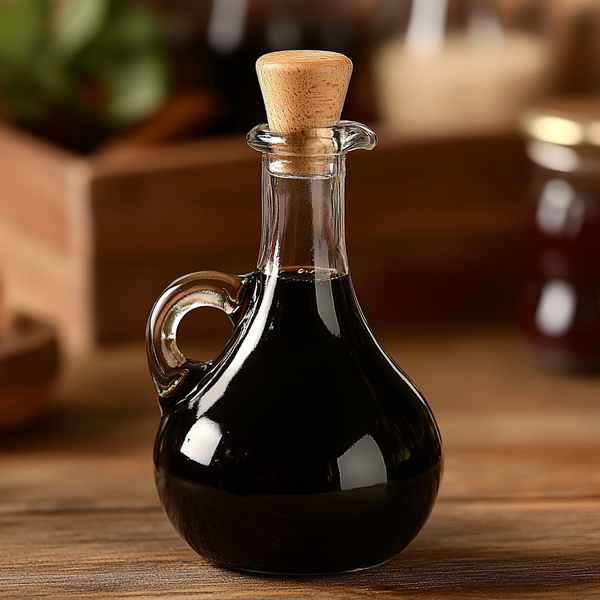
Balsamic vinegar
Balsamic vinegar is a rich, concentrated vinegar originating from Italy, specifically the Modena and Reggio Emilia regions. It is made from grape must (crushed grape juice with skins, seeds, and stems) that is fermented and aged. Balsamic vinegar is highly valued for its complex, sweet, and tangy flavor and is used in various culinary applications:
Salad Dressings: One of the most common uses for balsamic vinegar is in vinaigrettes and salad dressings. It pairs wonderfully with olive oil and is often used to dress leafy green salads, caprese salad, or grain salads.
Marinades: Balsamic vinegar is excellent for marinating meats, poultry, and vegetables. Its acidity helps tenderize meats while adding deep flavor.
Glazes and Reductions: Balsamic vinegar can be reduced to a thicker glaze, which intensifies its sweetness and tanginess. This glaze can be brushed on meats, drizzled over grilled vegetables, or used as a topping for desserts like strawberries and ice cream.
Roasting Vegetables: Drizzling balsamic vinegar on vegetables before roasting can enhance their natural sweetness. It works particularly well with root vegetables and winter squash.
Finishing Sauce: A splash of balsamic vinegar can be added at the end of cooking to brighten up soups, stews, and sauces. It provides a nice counterbalance to rich dishes.
Dipping Sauce: Balsamic vinegar mixed with olive oil makes a simple yet flavorful dipping sauce for bread, particularly crusty Italian or sourdough bread.
Desserts: Balsamic vinegar can be used in sweet applications as well. It's particularly delicious with fruits like berries or pears, enhancing their flavors and adding a complex sweetness.
Cheese Pairing: Aged balsamic vinegar can be drizzled over cheeses such as Parmesan, goat cheese, or fresh mozzarella as part of a cheese platter, adding a rich flavor that complements the creaminess of the cheese.
Balsamic vinegar comes in various grades, from the highly aged and expensive traditional balsamic to more affordable commercial versions. The quality and age of the balsamic vinegar will influence how it is best used in cooking, with the finer ones often used sparingly as a condiment or finishing touch.
Nutritional Information
carbohydrates
undefined g
fats
undefined g
protein
undefined g